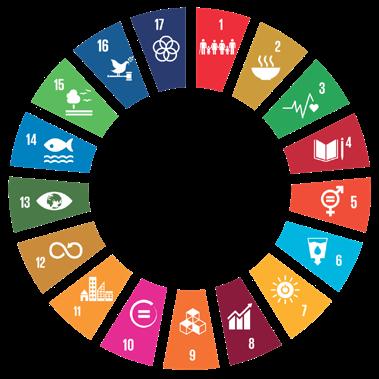
4 minute read
Caribbean countries discuss their Voluntary National Reviews progress

Later countries from Latin America and the Caribbean will present their Voluntary National Reviews (VNRs) to the High-level Political Forum on Sustainable Development (HLPF) when this Ministerial Meeting convened by the General Assembly of the United Nations is held virtually during July 2020. These countries are Argentina, Barbados, Costa Rica, Ecuador, Honduras, Panama, Peru, Saint Vincent and the Grenadines, and Trinidad and Tobago.
ECLAC recently convened a virtual meeting for Caribbean countries with national authorities in charge of follow-up of the 2030 Agenda for Sustainable Development, technical government representatives and experts from ECLAC and the United Nations System. Termed a ‘communities of practice’ event, the meeting was intended to support peer learning and sharing of experience to enhance the countries’ preparation for presentation of their VNRs at the HLPF. 4| The Hummingbird Speaking at the meeting, on 12 May 2020, Executive Secretary of ECLAC, Alicia Bárcena, noted the timeliness of the event, given the current crisis precipitated by the COVID-19 pandemic. She underscored the importance of ECLAC’s Caribbean First strategy, adopted in May 2018, “to consider the subregion´s specific needs and respond better to them, increase and enhance participation in our subsidiary bodies, and propose concrete measures, in particular on debt relief, building resilience, for instance with a proposal of creating a Caribbean resilience fund with a view to a globally coordinated debt deleveraging mechanism with a climate component to address the global debt overhang problem: standstills and debt moratorium.”
She further noted that ECLAC was undertaking extensive research and analysis on the impact of COVID-19 on the wider Latin American and Caribbean region and the multi-sectoral challenges that the pandemic implied for the region. She spoke specifically to its impact on economic, social and environmental matters in the short and medium term, and more broadly to its effect on the region's sustainable development trajectory in the context of the 2030 Agenda.
Bárcena committed ECLAC’s continued support to member States for planning and building national statistical systems. She also offered assistance with the production of analyses on the impacts of the pandemic, and to providing evidence-based public policy advice in response to the crisis.
This event was part of a series of monthly virtual meetings first launched in December 2019, which offer an opportunity to exchange experiences, best practices and challenges encountered in the process of preparing VNRs.
The Escazú Agreement Strengthening climate action
The challenge
Holding the increase in the global average temperature to well below 2°C above pre-industrial levels and pursuing efforts to limit the temperature increase to 1.5°C above pre-industrial levels (Paris Agreement) Public participation and access to information and knowledge are How to tackle it essential to design and apply effective climate policies. ü Generate and grant access to climate information, The Escazú Agreement is ü increasing awareness Guarantee the full and effective participation of all and consider local knowledge in climate policies and actions an unprecedented tool to catalyse climate governance and action in Latin America ü Protect those that defend the environment and the Caribbean. and climate action
Regional developments
Art. 6.3
Art. 6.4
Art. 6.5
Each Party shall have in place one or more up-to-date environmental information systems, which may include (...) climate change sources. Each Party shall take steps to establish a pollutant release and transfer register. Each Party shall develop and implement an early warning system.
Escazú Agreement
Regional Agreement on Access to Information, Public Participation and Justice in Environmental Matters in Latin America and the Caribbean
100% All 33 countries have ratified the United Nations Framework Convention on Climate Change and the Paris Agreement
22
22 of 33 countries have signed the Escazú Agreement, 8 have ratified it and 11 are needed for it to enter into force 5 5 of 33 countries include express references
Paris Agreement
Mutual reinforcement for climate empowerment
Art. 12
Parties shall cooperate in taking measures, as appropriate, to enhance climate change education, training, public awareness, public participation and public access to information.
Art. 6
Education, training and public awareness; (ii) Public access to information on climate change and its effects; (iii) Public participation in addressing climate change and its effects and developing adequate responses.
United Nations Framework Convention (UNFCCC)
on Climate Change
to climate change in their constitutions
9
9 of 33 countries have climate change laws, all of which include provisions on information and participation
25
25 of 33 countries have set up multistakeholder committees or councils to address the challenges of climate change
Updated as of May 2020.
The human rights-based approach in the nationally determined contributions (NDCs) of Latin America and the Caribbean, as of May 2020
(Number of countries)
100% 90% 80% 70% 60% 50%
33
40% 30% 20% 10%
14 16 14 Recommendations for updating NDCs (2020-2021)
üStrengthen public participation in their development, implementation, follow-up and evaluation ü Give particular consideration to vulnerable groups to move towards a just transition ü Actively involve women, youth, indigenous peoples and persons with disabilities in climate action ü Ensure a safe environment for environmental human rights defenders and climate defenders in accordance with the Escazú Agreement







